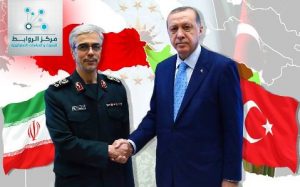Muammar Faisal Kholi *
From above ,a contrast that has reached at some of its stations to a stage of indirect clash, Ankera and Tehran extend their hands to come together to face common challenges imposed by the stormy developments in the region. Turkish president Recep Tayyip Erdogan meet in Ankara Iranian Chief of Staff Major General Mohammad Bagheri, who is visiting Turkey in the first visit of its kind by an Iranian official on this level since 1971. The visit constituted a milestone in the relations between the two countries. Where it showed a great deal of security and military coordination about the Kurdish and Syrian issues, after years of mutual accusations between the two sides ,and the war launched by proxy and directly in Syria and Iraq arenas. And the significance of the visit coincided with a period in which regional developments shed its shadow on the security and military issues in which the Iranian army plays an active role.
A continuing internal wars constitute , in the region, and countries that have been weakened or collapsed, and organizations that have increased their strength and their roles, terrorism, immigration, and criminal networks and border security, the main character of the security problems in the new phase. The increase of the activities of the organization Daesh and the PKK in particular, as well as the escalation of the US Western and Russian military and intelligence activities represent a common concern for both countries. There is a real fact that this complicated scene has radically changed rules and relations of traditional alliance and means of intervention. What are their implications?
Turkish-Iranian relations have seen ups and downs since the Iranian revolution in 1979. The relations are continued on the political, diplomatic and economic levels. However, the low level of military cooperation form the weakest link in the two countries’ relations. And the decline of military ties attributed to the concept of priorities, security and its ideological options for the two sides. The poor military relations have other reasons, including the presence of Turkey within the Western defense system as a member of NATO, and the ambiguous position of the Turkish army towards the Iranian regime, and the negative atmosphere caused by the US-Iranian relations, in addition to Iran relations with the PKK. Iran has continued, as it seeks to get rid of its isolation and gain legitimacy, its efforts to expand and strengthen its military ties with Turkey. In addition to request military equipment from time to time that it worked to conduct visits at a high level and the establishment of close ties. Although the two militaries have been meeting continuously to discuss issues of the border security but relations have remained symbolic.
It seems that all these developments have shaped in the decision-makers in Turkey and Iran, the idea of a serious change in the region. It is clear that the appropriate response to that would be through cooperation and means of different nature. There is a long list of issues of common interest that the talks showed a consensus about three basic issues:
1. The two sides rejected the referendum in the Kurdistan region of Iraq, but the refusal went beyond than this to reach to the extent of the threat of taking joint action, on the grounds that the referendum threatens the stability of the region, which means there is a real fear on both sides of the results of the referendum on the Kurdish issue that will be reflected in Turkey and Iran on the grounds the Kurds of the two countries may demand later such a referendum.
2. The agreement on the coordination of military and security cooperation against «PKK» in both Turkey and Iran, («PJAK» Party, which is an Iranian branch of the Workers’ Party). This agreement comes after years of Turkish accusations of Iran to support «PKK» and its Syrian ally «Democratic Union Party» and its military wing « People’s Protection Units ».
3. To intensify cooperation regarding of reduction of tensions in the de-escalation zones in Syria, particularly in the north, where the province of Idlib, which turned to be the point of gathering of armed groups despite the control of the «victory Front» recently on almost the entire province, this cooperation comes after years of mutual strife in the field amid mutual accusations of sectarian policy, reached a mutual criticism on the air.
This consensus does not mean that the motives that feed multiple forms of tension in the Turkish-Iranian relations have ended, but it can be said that the regional developments, and the situation of political liquidity in the region and strained Turkey’s relations with its traditional allies, and the practice of management Trump a policy of “sanctions and pressure” against Iran, pushed the two states to a review of the nature of their bilateral relations through the use of new mechanism and approaches in the Turkish-Iranian relations that the military and security cooperation may be a new approaches in their regional cooperation to serve their common interests. Political realism is constantly assures us that international relations are not going on a straight line.
Rawabet Center for Research and Strategic Studies
ر

